Annotated Bibliography: Facebook Platform for Business Communication
VerifiedAdded on 2022/09/21
|11
|2723
|29
Annotated Bibliography
AI Summary
This annotated bibliography examines the effectiveness of the Facebook platform as a vehicle for business communication. It explores various scholarly articles, books, and online resources that either support or refute the use of Facebook for business purposes. The bibliography is divided into two sections: the first highlights sources that argue for Facebook's usefulness in business communication, emphasizing its potential for marketing, customer engagement, and information sharing. The second section presents sources that criticize Facebook, focusing on issues such as privacy concerns, distractions, and the potential for negative publicity. The sources cover a wide range of perspectives, from academic research to practical guides, providing a comprehensive overview of the debate surrounding Facebook's role in modern business communication. The bibliography includes works by authors such as Baruah, Çalicioğlu, Dwyer, Agrawal, Rao, Flegg, Debatin, McQuerrey, Lativate Canada, and Gordon, offering a balanced view on the subject.
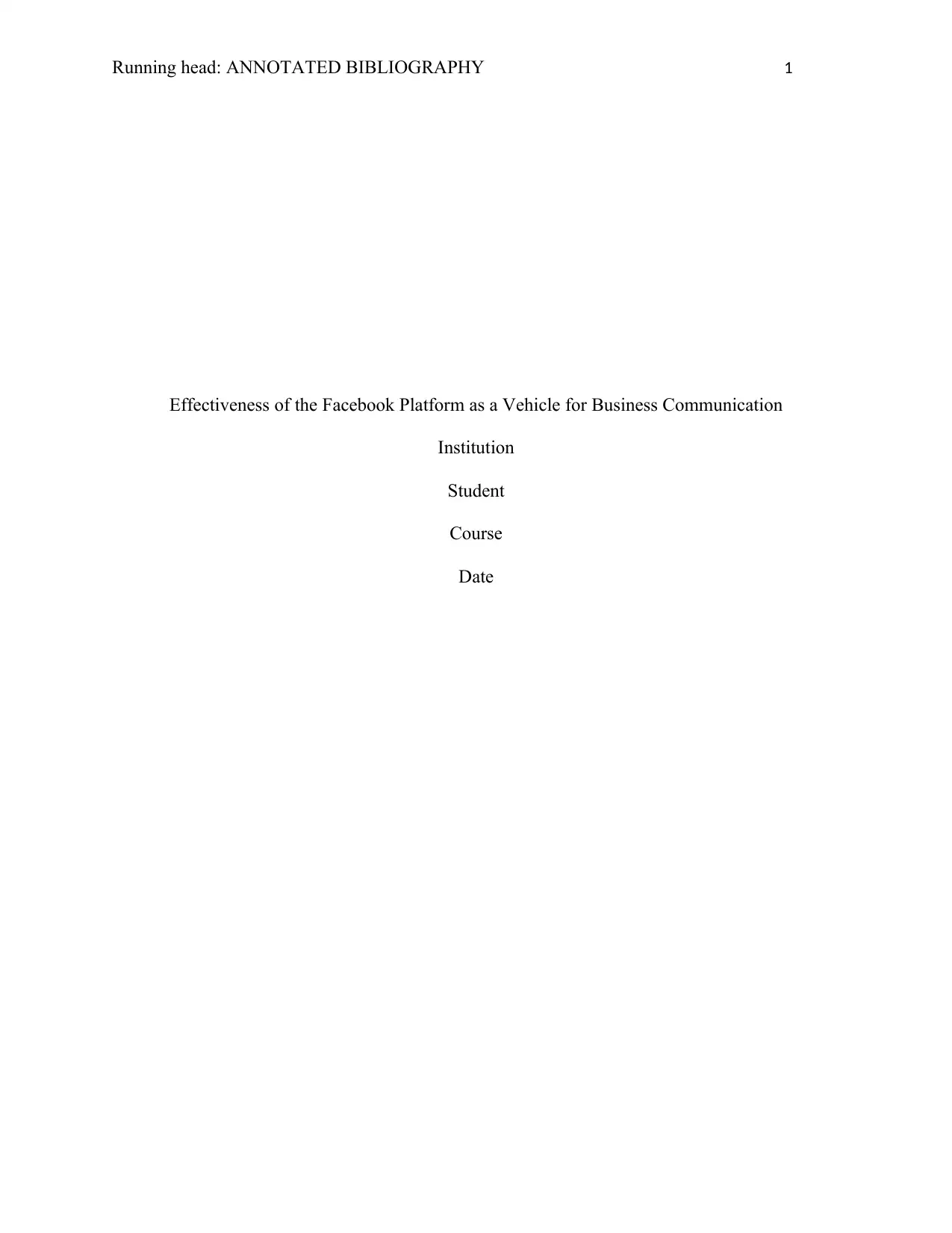
Running head: ANNOTATED BIBLIOGRAPHY 1
Effectiveness of the Facebook Platform as a Vehicle for Business Communication
Institution
Student
Course
Date
Effectiveness of the Facebook Platform as a Vehicle for Business Communication
Institution
Student
Course
Date
Paraphrase This Document
Need a fresh take? Get an instant paraphrase of this document with our AI Paraphraser
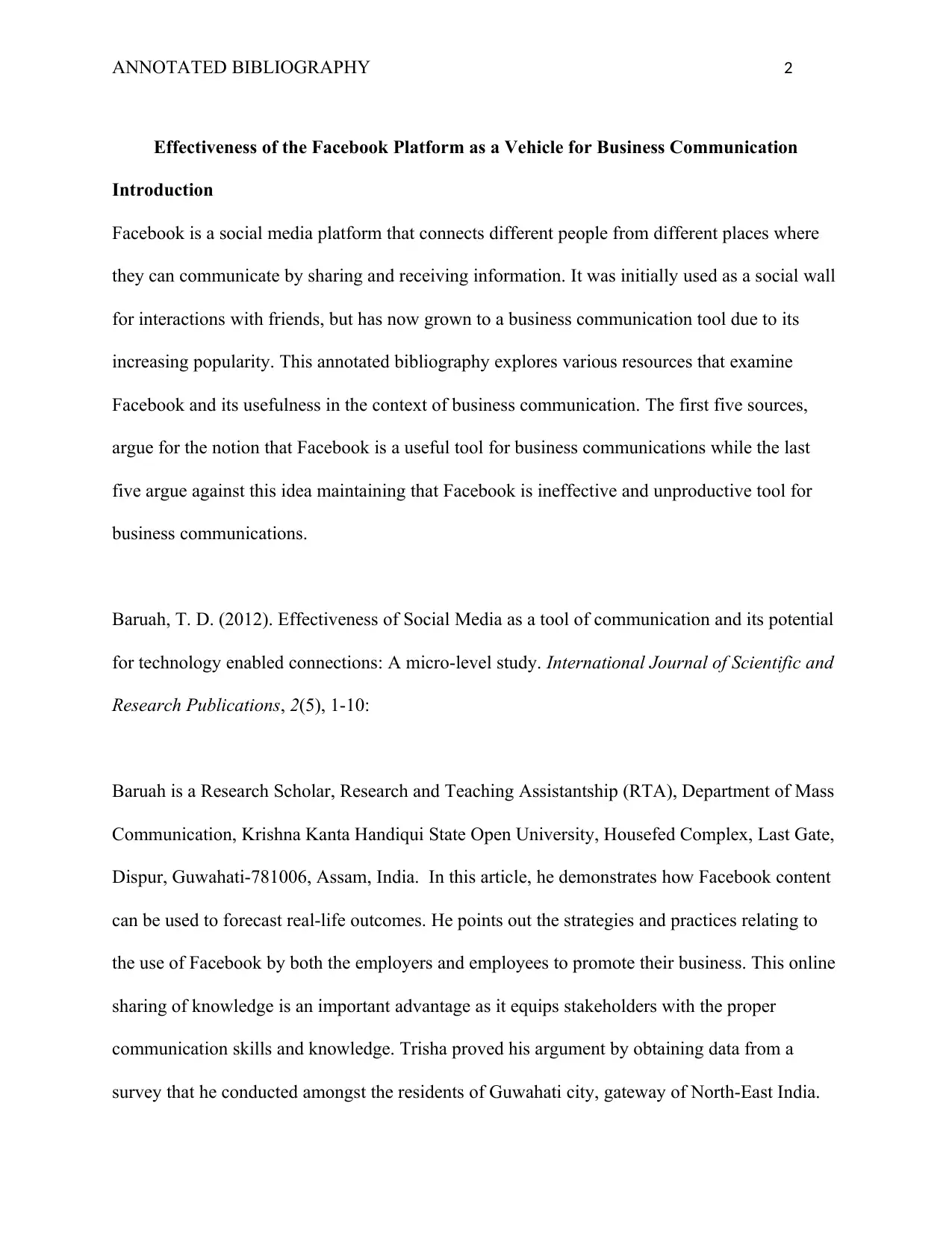
ANNOTATED BIBLIOGRAPHY 2
Effectiveness of the Facebook Platform as a Vehicle for Business Communication
Introduction
Facebook is a social media platform that connects different people from different places where
they can communicate by sharing and receiving information. It was initially used as a social wall
for interactions with friends, but has now grown to a business communication tool due to its
increasing popularity. This annotated bibliography explores various resources that examine
Facebook and its usefulness in the context of business communication. The first five sources,
argue for the notion that Facebook is a useful tool for business communications while the last
five argue against this idea maintaining that Facebook is ineffective and unproductive tool for
business communications.
Baruah, T. D. (2012). Effectiveness of Social Media as a tool of communication and its potential
for technology enabled connections: A micro-level study. International Journal of Scientific and
Research Publications, 2(5), 1-10:
Baruah is a Research Scholar, Research and Teaching Assistantship (RTA), Department of Mass
Communication, Krishna Kanta Handiqui State Open University, Housefed Complex, Last Gate,
Dispur, Guwahati-781006, Assam, India. In this article, he demonstrates how Facebook content
can be used to forecast real-life outcomes. He points out the strategies and practices relating to
the use of Facebook by both the employers and employees to promote their business. This online
sharing of knowledge is an important advantage as it equips stakeholders with the proper
communication skills and knowledge. Trisha proved his argument by obtaining data from a
survey that he conducted amongst the residents of Guwahati city, gateway of North-East India.
Effectiveness of the Facebook Platform as a Vehicle for Business Communication
Introduction
Facebook is a social media platform that connects different people from different places where
they can communicate by sharing and receiving information. It was initially used as a social wall
for interactions with friends, but has now grown to a business communication tool due to its
increasing popularity. This annotated bibliography explores various resources that examine
Facebook and its usefulness in the context of business communication. The first five sources,
argue for the notion that Facebook is a useful tool for business communications while the last
five argue against this idea maintaining that Facebook is ineffective and unproductive tool for
business communications.
Baruah, T. D. (2012). Effectiveness of Social Media as a tool of communication and its potential
for technology enabled connections: A micro-level study. International Journal of Scientific and
Research Publications, 2(5), 1-10:
Baruah is a Research Scholar, Research and Teaching Assistantship (RTA), Department of Mass
Communication, Krishna Kanta Handiqui State Open University, Housefed Complex, Last Gate,
Dispur, Guwahati-781006, Assam, India. In this article, he demonstrates how Facebook content
can be used to forecast real-life outcomes. He points out the strategies and practices relating to
the use of Facebook by both the employers and employees to promote their business. This online
sharing of knowledge is an important advantage as it equips stakeholders with the proper
communication skills and knowledge. Trisha proved his argument by obtaining data from a
survey that he conducted amongst the residents of Guwahati city, gateway of North-East India.
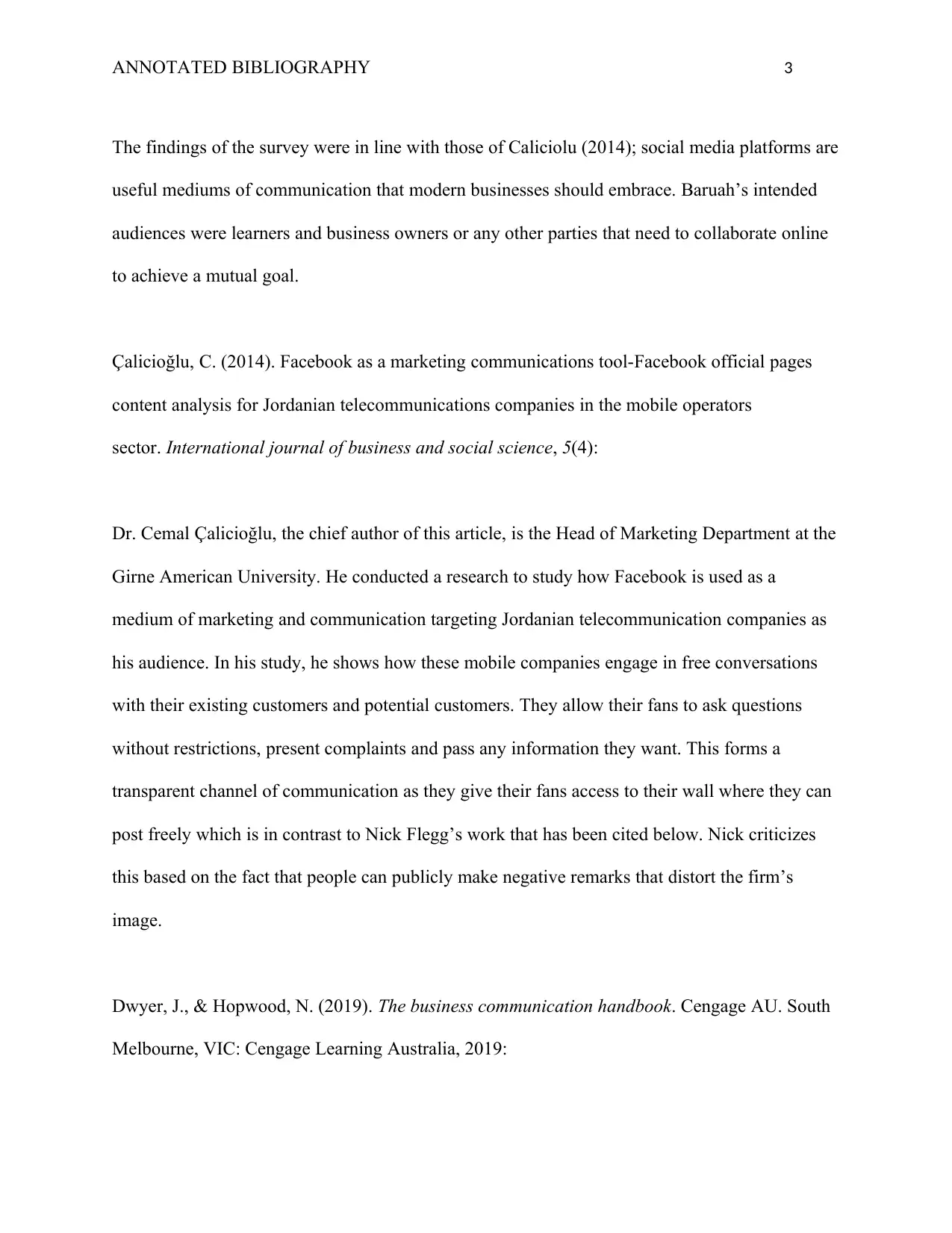
ANNOTATED BIBLIOGRAPHY 3
The findings of the survey were in line with those of Caliciolu (2014); social media platforms are
useful mediums of communication that modern businesses should embrace. Baruah’s intended
audiences were learners and business owners or any other parties that need to collaborate online
to achieve a mutual goal.
Çalicioğlu, C. (2014). Facebook as a marketing communications tool-Facebook official pages
content analysis for Jordanian telecommunications companies in the mobile operators
sector. International journal of business and social science, 5(4):
Dr. Cemal Çalicioğlu, the chief author of this article, is the Head of Marketing Department at the
Girne American University. He conducted a research to study how Facebook is used as a
medium of marketing and communication targeting Jordanian telecommunication companies as
his audience. In his study, he shows how these mobile companies engage in free conversations
with their existing customers and potential customers. They allow their fans to ask questions
without restrictions, present complaints and pass any information they want. This forms a
transparent channel of communication as they give their fans access to their wall where they can
post freely which is in contrast to Nick Flegg’s work that has been cited below. Nick criticizes
this based on the fact that people can publicly make negative remarks that distort the firm’s
image.
Dwyer, J., & Hopwood, N. (2019). The business communication handbook. Cengage AU. South
Melbourne, VIC: Cengage Learning Australia, 2019:
The findings of the survey were in line with those of Caliciolu (2014); social media platforms are
useful mediums of communication that modern businesses should embrace. Baruah’s intended
audiences were learners and business owners or any other parties that need to collaborate online
to achieve a mutual goal.
Çalicioğlu, C. (2014). Facebook as a marketing communications tool-Facebook official pages
content analysis for Jordanian telecommunications companies in the mobile operators
sector. International journal of business and social science, 5(4):
Dr. Cemal Çalicioğlu, the chief author of this article, is the Head of Marketing Department at the
Girne American University. He conducted a research to study how Facebook is used as a
medium of marketing and communication targeting Jordanian telecommunication companies as
his audience. In his study, he shows how these mobile companies engage in free conversations
with their existing customers and potential customers. They allow their fans to ask questions
without restrictions, present complaints and pass any information they want. This forms a
transparent channel of communication as they give their fans access to their wall where they can
post freely which is in contrast to Nick Flegg’s work that has been cited below. Nick criticizes
this based on the fact that people can publicly make negative remarks that distort the firm’s
image.
Dwyer, J., & Hopwood, N. (2019). The business communication handbook. Cengage AU. South
Melbourne, VIC: Cengage Learning Australia, 2019:
⊘ This is a preview!⊘
Do you want full access?
Subscribe today to unlock all pages.

Trusted by 1+ million students worldwide
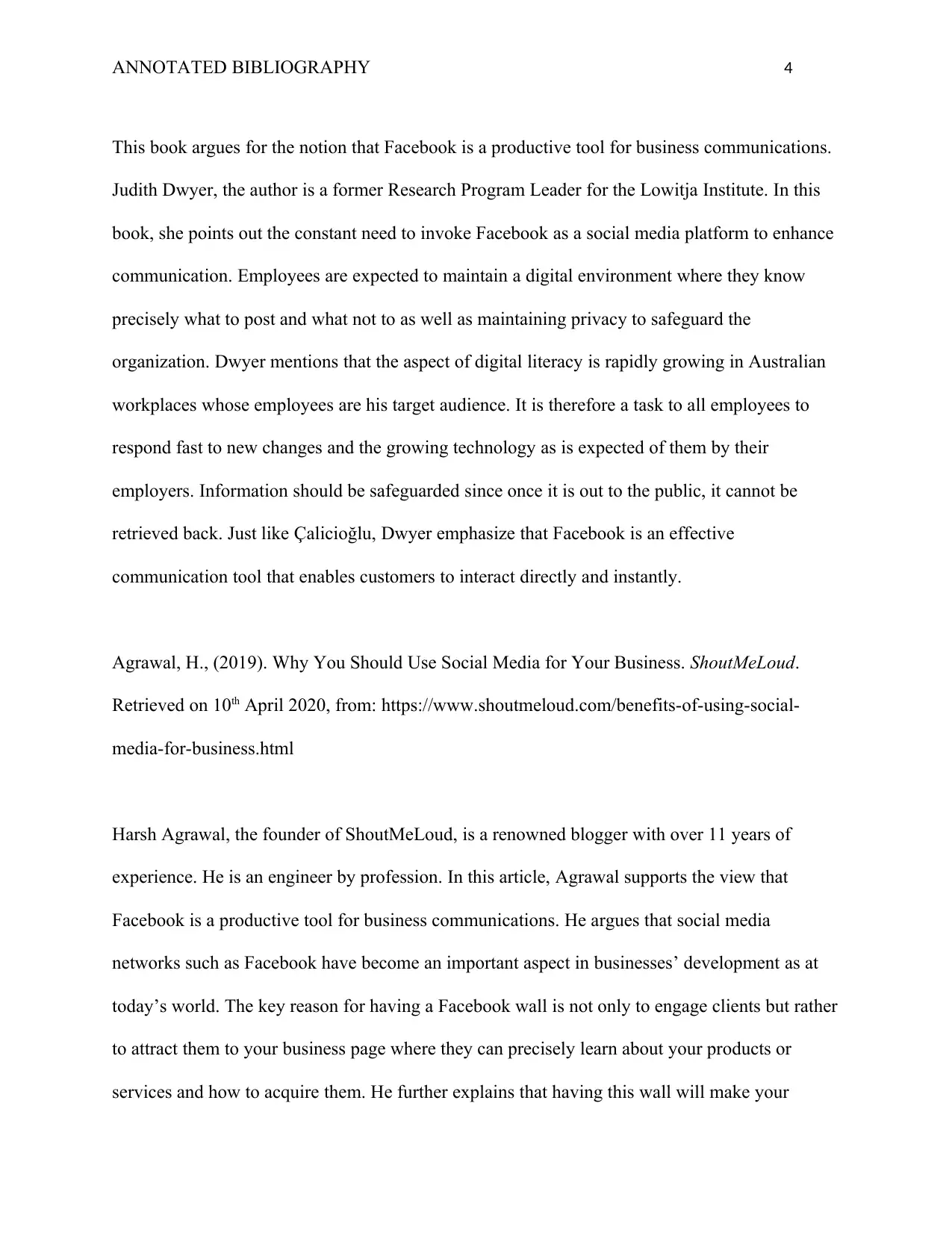
ANNOTATED BIBLIOGRAPHY 4
This book argues for the notion that Facebook is a productive tool for business communications.
Judith Dwyer, the author is a former Research Program Leader for the Lowitja Institute. In this
book, she points out the constant need to invoke Facebook as a social media platform to enhance
communication. Employees are expected to maintain a digital environment where they know
precisely what to post and what not to as well as maintaining privacy to safeguard the
organization. Dwyer mentions that the aspect of digital literacy is rapidly growing in Australian
workplaces whose employees are his target audience. It is therefore a task to all employees to
respond fast to new changes and the growing technology as is expected of them by their
employers. Information should be safeguarded since once it is out to the public, it cannot be
retrieved back. Just like Çalicioğlu, Dwyer emphasize that Facebook is an effective
communication tool that enables customers to interact directly and instantly.
Agrawal, H., (2019). Why You Should Use Social Media for Your Business. ShoutMeLoud.
Retrieved on 10th April 2020, from: https://www.shoutmeloud.com/benefits-of-using-social-
media-for-business.html
Harsh Agrawal, the founder of ShoutMeLoud, is a renowned blogger with over 11 years of
experience. He is an engineer by profession. In this article, Agrawal supports the view that
Facebook is a productive tool for business communications. He argues that social media
networks such as Facebook have become an important aspect in businesses’ development as at
today’s world. The key reason for having a Facebook wall is not only to engage clients but rather
to attract them to your business page where they can precisely learn about your products or
services and how to acquire them. He further explains that having this wall will make your
This book argues for the notion that Facebook is a productive tool for business communications.
Judith Dwyer, the author is a former Research Program Leader for the Lowitja Institute. In this
book, she points out the constant need to invoke Facebook as a social media platform to enhance
communication. Employees are expected to maintain a digital environment where they know
precisely what to post and what not to as well as maintaining privacy to safeguard the
organization. Dwyer mentions that the aspect of digital literacy is rapidly growing in Australian
workplaces whose employees are his target audience. It is therefore a task to all employees to
respond fast to new changes and the growing technology as is expected of them by their
employers. Information should be safeguarded since once it is out to the public, it cannot be
retrieved back. Just like Çalicioğlu, Dwyer emphasize that Facebook is an effective
communication tool that enables customers to interact directly and instantly.
Agrawal, H., (2019). Why You Should Use Social Media for Your Business. ShoutMeLoud.
Retrieved on 10th April 2020, from: https://www.shoutmeloud.com/benefits-of-using-social-
media-for-business.html
Harsh Agrawal, the founder of ShoutMeLoud, is a renowned blogger with over 11 years of
experience. He is an engineer by profession. In this article, Agrawal supports the view that
Facebook is a productive tool for business communications. He argues that social media
networks such as Facebook have become an important aspect in businesses’ development as at
today’s world. The key reason for having a Facebook wall is not only to engage clients but rather
to attract them to your business page where they can precisely learn about your products or
services and how to acquire them. He further explains that having this wall will make your
Paraphrase This Document
Need a fresh take? Get an instant paraphrase of this document with our AI Paraphraser
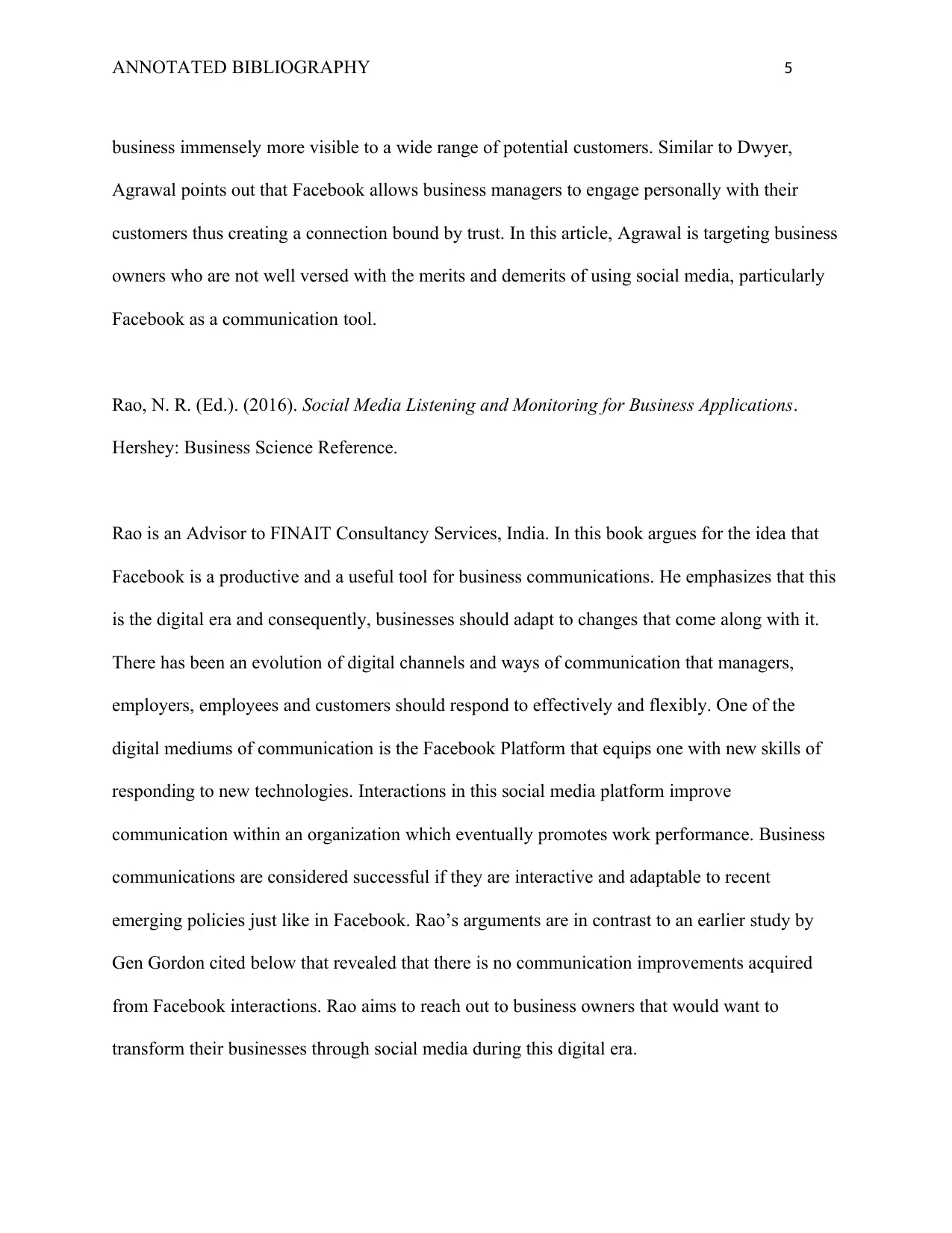
ANNOTATED BIBLIOGRAPHY 5
business immensely more visible to a wide range of potential customers. Similar to Dwyer,
Agrawal points out that Facebook allows business managers to engage personally with their
customers thus creating a connection bound by trust. In this article, Agrawal is targeting business
owners who are not well versed with the merits and demerits of using social media, particularly
Facebook as a communication tool.
Rao, N. R. (Ed.). (2016). Social Media Listening and Monitoring for Business Applications.
Hershey: Business Science Reference.
Rao is an Advisor to FINAIT Consultancy Services, India. In this book argues for the idea that
Facebook is a productive and a useful tool for business communications. He emphasizes that this
is the digital era and consequently, businesses should adapt to changes that come along with it.
There has been an evolution of digital channels and ways of communication that managers,
employers, employees and customers should respond to effectively and flexibly. One of the
digital mediums of communication is the Facebook Platform that equips one with new skills of
responding to new technologies. Interactions in this social media platform improve
communication within an organization which eventually promotes work performance. Business
communications are considered successful if they are interactive and adaptable to recent
emerging policies just like in Facebook. Rao’s arguments are in contrast to an earlier study by
Gen Gordon cited below that revealed that there is no communication improvements acquired
from Facebook interactions. Rao aims to reach out to business owners that would want to
transform their businesses through social media during this digital era.
business immensely more visible to a wide range of potential customers. Similar to Dwyer,
Agrawal points out that Facebook allows business managers to engage personally with their
customers thus creating a connection bound by trust. In this article, Agrawal is targeting business
owners who are not well versed with the merits and demerits of using social media, particularly
Facebook as a communication tool.
Rao, N. R. (Ed.). (2016). Social Media Listening and Monitoring for Business Applications.
Hershey: Business Science Reference.
Rao is an Advisor to FINAIT Consultancy Services, India. In this book argues for the idea that
Facebook is a productive and a useful tool for business communications. He emphasizes that this
is the digital era and consequently, businesses should adapt to changes that come along with it.
There has been an evolution of digital channels and ways of communication that managers,
employers, employees and customers should respond to effectively and flexibly. One of the
digital mediums of communication is the Facebook Platform that equips one with new skills of
responding to new technologies. Interactions in this social media platform improve
communication within an organization which eventually promotes work performance. Business
communications are considered successful if they are interactive and adaptable to recent
emerging policies just like in Facebook. Rao’s arguments are in contrast to an earlier study by
Gen Gordon cited below that revealed that there is no communication improvements acquired
from Facebook interactions. Rao aims to reach out to business owners that would want to
transform their businesses through social media during this digital era.
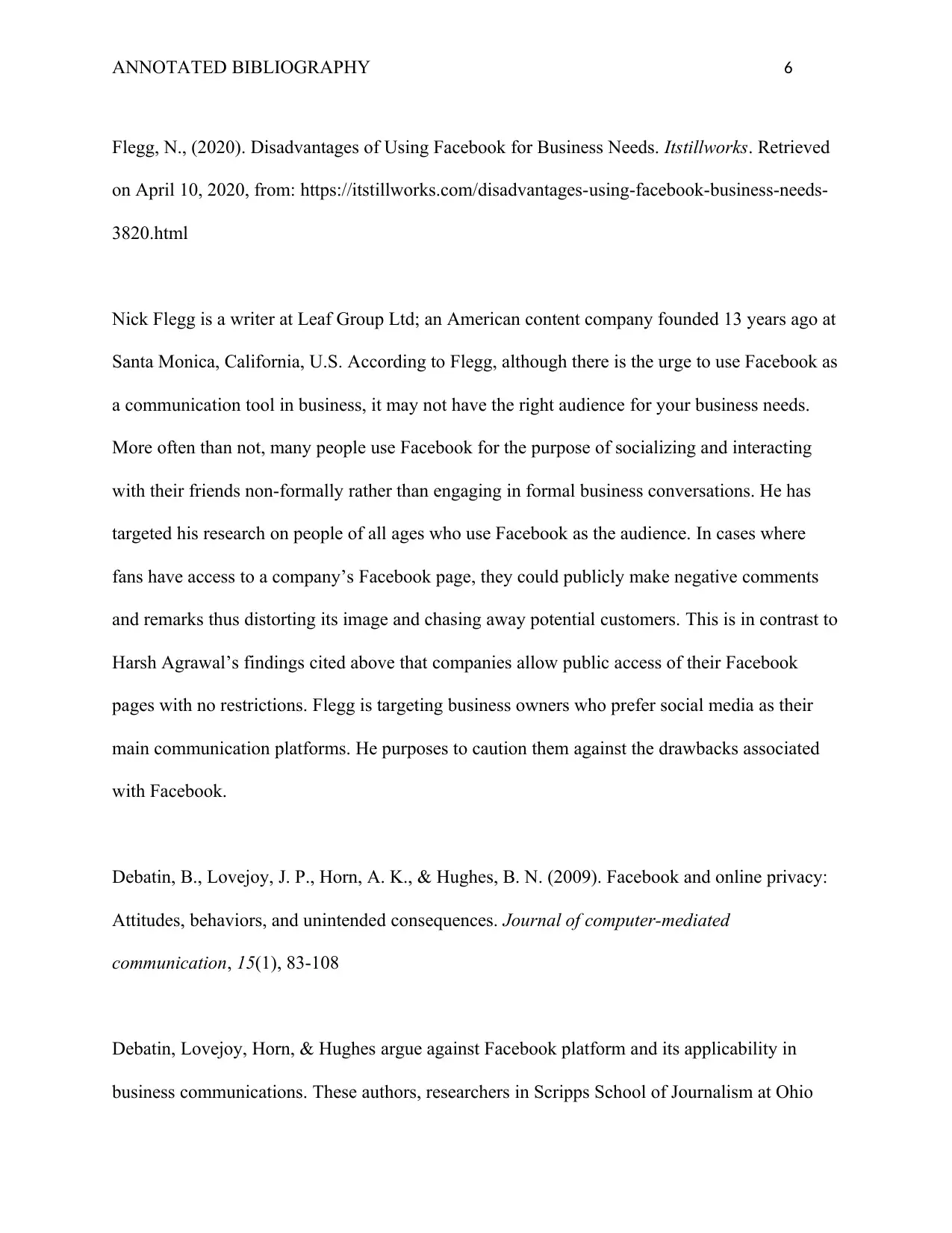
ANNOTATED BIBLIOGRAPHY 6
Flegg, N., (2020). Disadvantages of Using Facebook for Business Needs. Itstillworks. Retrieved
on April 10, 2020, from: https://itstillworks.com/disadvantages-using-facebook-business-needs-
3820.html
Nick Flegg is a writer at Leaf Group Ltd; an American content company founded 13 years ago at
Santa Monica, California, U.S. According to Flegg, although there is the urge to use Facebook as
a communication tool in business, it may not have the right audience for your business needs.
More often than not, many people use Facebook for the purpose of socializing and interacting
with their friends non-formally rather than engaging in formal business conversations. He has
targeted his research on people of all ages who use Facebook as the audience. In cases where
fans have access to a company’s Facebook page, they could publicly make negative comments
and remarks thus distorting its image and chasing away potential customers. This is in contrast to
Harsh Agrawal’s findings cited above that companies allow public access of their Facebook
pages with no restrictions. Flegg is targeting business owners who prefer social media as their
main communication platforms. He purposes to caution them against the drawbacks associated
with Facebook.
Debatin, B., Lovejoy, J. P., Horn, A. K., & Hughes, B. N. (2009). Facebook and online privacy:
Attitudes, behaviors, and unintended consequences. Journal of computer-mediated
communication, 15(1), 83-108
Debatin, Lovejoy, Horn, & Hughes argue against Facebook platform and its applicability in
business communications. These authors, researchers in Scripps School of Journalism at Ohio
Flegg, N., (2020). Disadvantages of Using Facebook for Business Needs. Itstillworks. Retrieved
on April 10, 2020, from: https://itstillworks.com/disadvantages-using-facebook-business-needs-
3820.html
Nick Flegg is a writer at Leaf Group Ltd; an American content company founded 13 years ago at
Santa Monica, California, U.S. According to Flegg, although there is the urge to use Facebook as
a communication tool in business, it may not have the right audience for your business needs.
More often than not, many people use Facebook for the purpose of socializing and interacting
with their friends non-formally rather than engaging in formal business conversations. He has
targeted his research on people of all ages who use Facebook as the audience. In cases where
fans have access to a company’s Facebook page, they could publicly make negative comments
and remarks thus distorting its image and chasing away potential customers. This is in contrast to
Harsh Agrawal’s findings cited above that companies allow public access of their Facebook
pages with no restrictions. Flegg is targeting business owners who prefer social media as their
main communication platforms. He purposes to caution them against the drawbacks associated
with Facebook.
Debatin, B., Lovejoy, J. P., Horn, A. K., & Hughes, B. N. (2009). Facebook and online privacy:
Attitudes, behaviors, and unintended consequences. Journal of computer-mediated
communication, 15(1), 83-108
Debatin, Lovejoy, Horn, & Hughes argue against Facebook platform and its applicability in
business communications. These authors, researchers in Scripps School of Journalism at Ohio
⊘ This is a preview!⊘
Do you want full access?
Subscribe today to unlock all pages.

Trusted by 1+ million students worldwide
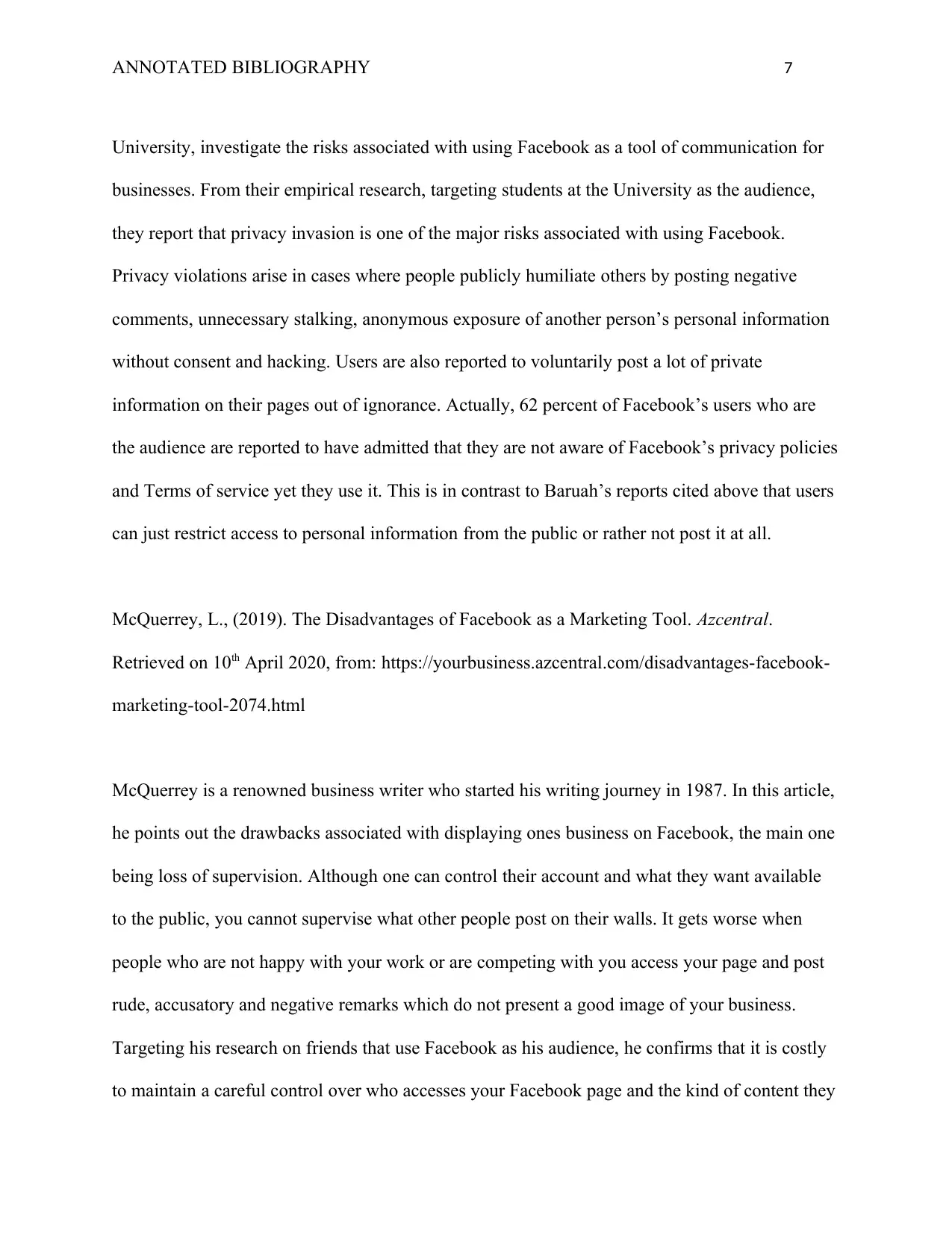
ANNOTATED BIBLIOGRAPHY 7
University, investigate the risks associated with using Facebook as a tool of communication for
businesses. From their empirical research, targeting students at the University as the audience,
they report that privacy invasion is one of the major risks associated with using Facebook.
Privacy violations arise in cases where people publicly humiliate others by posting negative
comments, unnecessary stalking, anonymous exposure of another person’s personal information
without consent and hacking. Users are also reported to voluntarily post a lot of private
information on their pages out of ignorance. Actually, 62 percent of Facebook’s users who are
the audience are reported to have admitted that they are not aware of Facebook’s privacy policies
and Terms of service yet they use it. This is in contrast to Baruah’s reports cited above that users
can just restrict access to personal information from the public or rather not post it at all.
McQuerrey, L., (2019). The Disadvantages of Facebook as a Marketing Tool. Azcentral.
Retrieved on 10th April 2020, from: https://yourbusiness.azcentral.com/disadvantages-facebook-
marketing-tool-2074.html
McQuerrey is a renowned business writer who started his writing journey in 1987. In this article,
he points out the drawbacks associated with displaying ones business on Facebook, the main one
being loss of supervision. Although one can control their account and what they want available
to the public, you cannot supervise what other people post on their walls. It gets worse when
people who are not happy with your work or are competing with you access your page and post
rude, accusatory and negative remarks which do not present a good image of your business.
Targeting his research on friends that use Facebook as his audience, he confirms that it is costly
to maintain a careful control over who accesses your Facebook page and the kind of content they
University, investigate the risks associated with using Facebook as a tool of communication for
businesses. From their empirical research, targeting students at the University as the audience,
they report that privacy invasion is one of the major risks associated with using Facebook.
Privacy violations arise in cases where people publicly humiliate others by posting negative
comments, unnecessary stalking, anonymous exposure of another person’s personal information
without consent and hacking. Users are also reported to voluntarily post a lot of private
information on their pages out of ignorance. Actually, 62 percent of Facebook’s users who are
the audience are reported to have admitted that they are not aware of Facebook’s privacy policies
and Terms of service yet they use it. This is in contrast to Baruah’s reports cited above that users
can just restrict access to personal information from the public or rather not post it at all.
McQuerrey, L., (2019). The Disadvantages of Facebook as a Marketing Tool. Azcentral.
Retrieved on 10th April 2020, from: https://yourbusiness.azcentral.com/disadvantages-facebook-
marketing-tool-2074.html
McQuerrey is a renowned business writer who started his writing journey in 1987. In this article,
he points out the drawbacks associated with displaying ones business on Facebook, the main one
being loss of supervision. Although one can control their account and what they want available
to the public, you cannot supervise what other people post on their walls. It gets worse when
people who are not happy with your work or are competing with you access your page and post
rude, accusatory and negative remarks which do not present a good image of your business.
Targeting his research on friends that use Facebook as his audience, he confirms that it is costly
to maintain a careful control over who accesses your Facebook page and the kind of content they
Paraphrase This Document
Need a fresh take? Get an instant paraphrase of this document with our AI Paraphraser
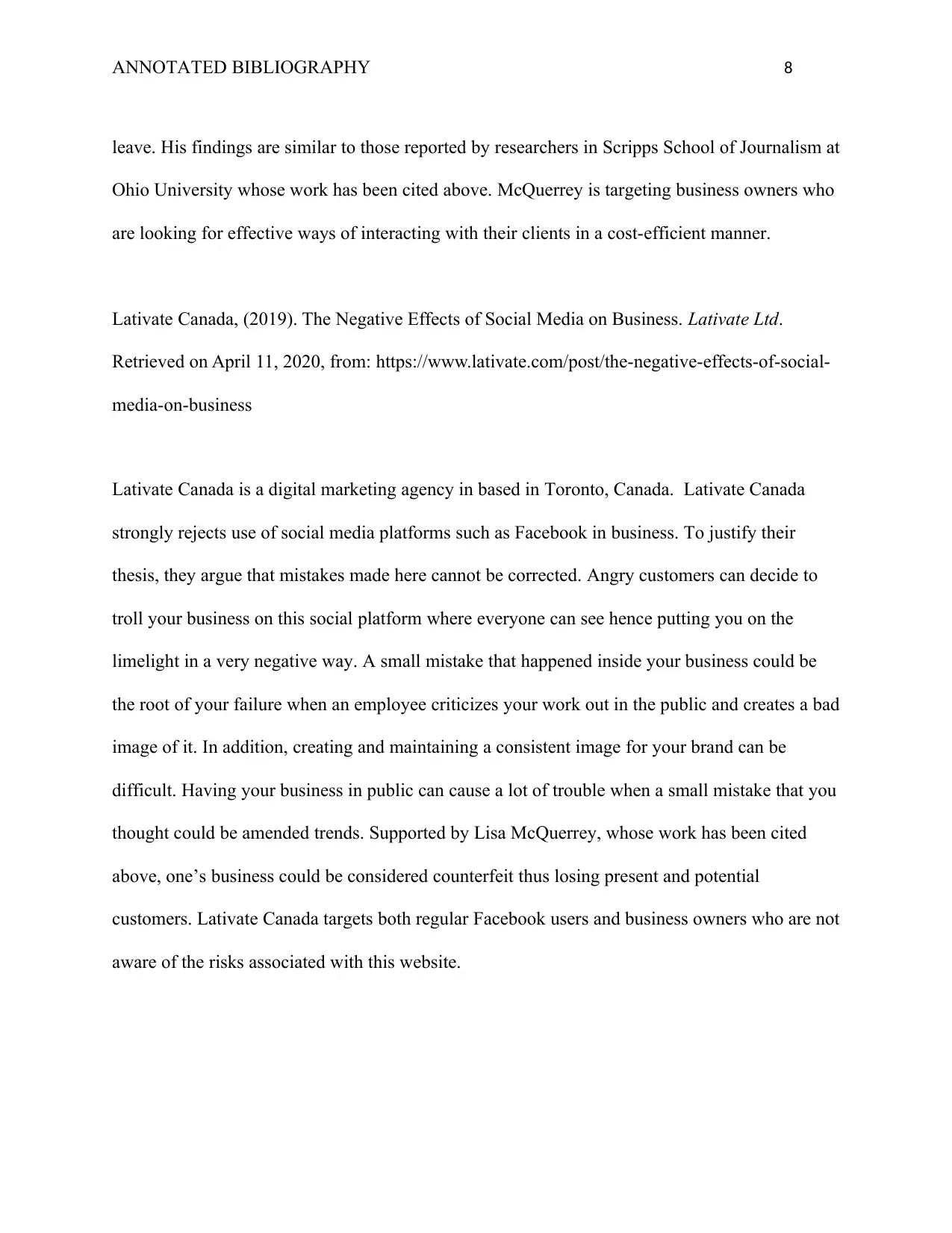
ANNOTATED BIBLIOGRAPHY 8
leave. His findings are similar to those reported by researchers in Scripps School of Journalism at
Ohio University whose work has been cited above. McQuerrey is targeting business owners who
are looking for effective ways of interacting with their clients in a cost-efficient manner.
Lativate Canada, (2019). The Negative Effects of Social Media on Business. Lativate Ltd.
Retrieved on April 11, 2020, from: https://www.lativate.com/post/the-negative-effects-of-social-
media-on-business
Lativate Canada is a digital marketing agency in based in Toronto, Canada. Lativate Canada
strongly rejects use of social media platforms such as Facebook in business. To justify their
thesis, they argue that mistakes made here cannot be corrected. Angry customers can decide to
troll your business on this social platform where everyone can see hence putting you on the
limelight in a very negative way. A small mistake that happened inside your business could be
the root of your failure when an employee criticizes your work out in the public and creates a bad
image of it. In addition, creating and maintaining a consistent image for your brand can be
difficult. Having your business in public can cause a lot of trouble when a small mistake that you
thought could be amended trends. Supported by Lisa McQuerrey, whose work has been cited
above, one’s business could be considered counterfeit thus losing present and potential
customers. Lativate Canada targets both regular Facebook users and business owners who are not
aware of the risks associated with this website.
leave. His findings are similar to those reported by researchers in Scripps School of Journalism at
Ohio University whose work has been cited above. McQuerrey is targeting business owners who
are looking for effective ways of interacting with their clients in a cost-efficient manner.
Lativate Canada, (2019). The Negative Effects of Social Media on Business. Lativate Ltd.
Retrieved on April 11, 2020, from: https://www.lativate.com/post/the-negative-effects-of-social-
media-on-business
Lativate Canada is a digital marketing agency in based in Toronto, Canada. Lativate Canada
strongly rejects use of social media platforms such as Facebook in business. To justify their
thesis, they argue that mistakes made here cannot be corrected. Angry customers can decide to
troll your business on this social platform where everyone can see hence putting you on the
limelight in a very negative way. A small mistake that happened inside your business could be
the root of your failure when an employee criticizes your work out in the public and creates a bad
image of it. In addition, creating and maintaining a consistent image for your brand can be
difficult. Having your business in public can cause a lot of trouble when a small mistake that you
thought could be amended trends. Supported by Lisa McQuerrey, whose work has been cited
above, one’s business could be considered counterfeit thus losing present and potential
customers. Lativate Canada targets both regular Facebook users and business owners who are not
aware of the risks associated with this website.
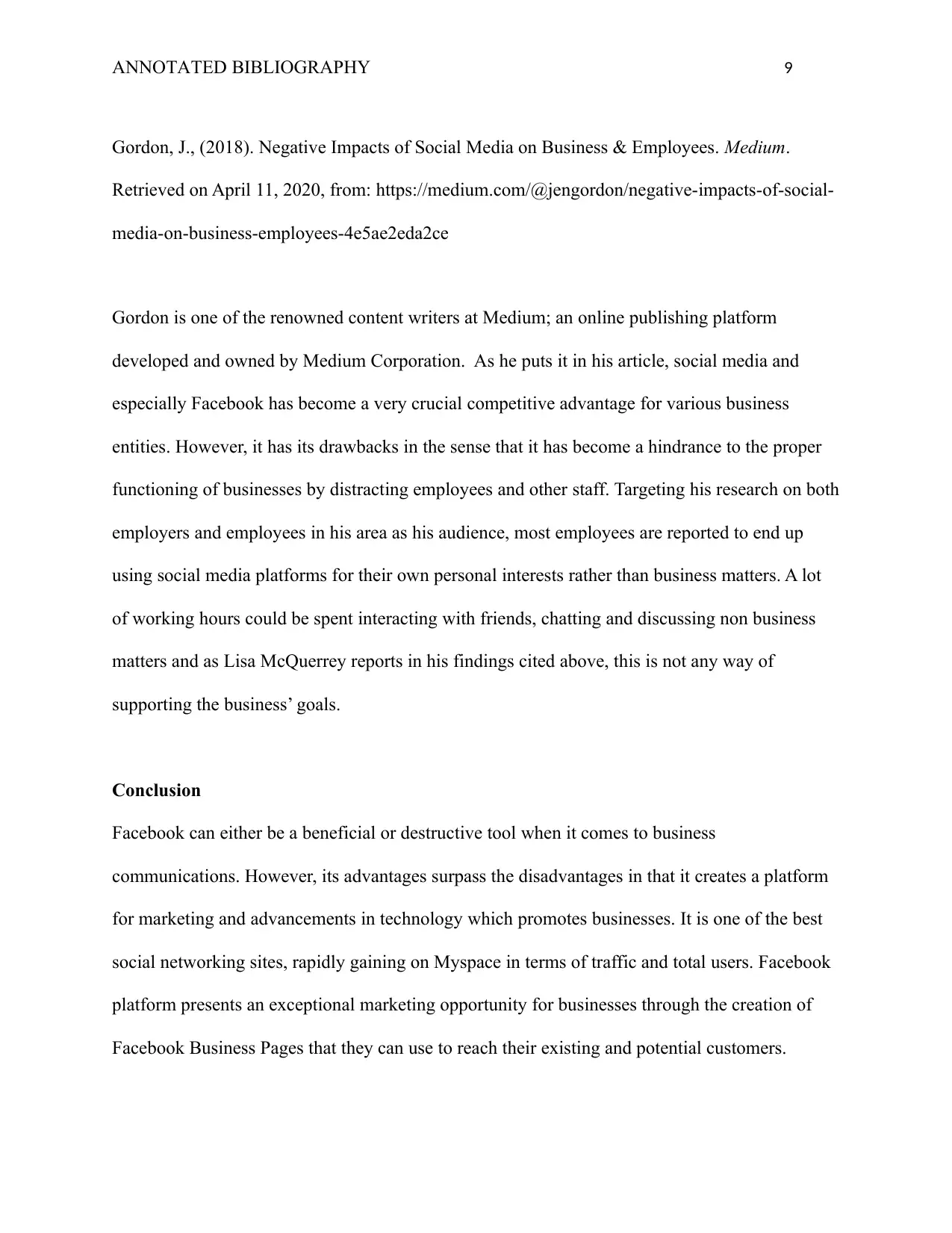
ANNOTATED BIBLIOGRAPHY 9
Gordon, J., (2018). Negative Impacts of Social Media on Business & Employees. Medium.
Retrieved on April 11, 2020, from: https://medium.com/@jengordon/negative-impacts-of-social-
media-on-business-employees-4e5ae2eda2ce
Gordon is one of the renowned content writers at Medium; an online publishing platform
developed and owned by Medium Corporation. As he puts it in his article, social media and
especially Facebook has become a very crucial competitive advantage for various business
entities. However, it has its drawbacks in the sense that it has become a hindrance to the proper
functioning of businesses by distracting employees and other staff. Targeting his research on both
employers and employees in his area as his audience, most employees are reported to end up
using social media platforms for their own personal interests rather than business matters. A lot
of working hours could be spent interacting with friends, chatting and discussing non business
matters and as Lisa McQuerrey reports in his findings cited above, this is not any way of
supporting the business’ goals.
Conclusion
Facebook can either be a beneficial or destructive tool when it comes to business
communications. However, its advantages surpass the disadvantages in that it creates a platform
for marketing and advancements in technology which promotes businesses. It is one of the best
social networking sites, rapidly gaining on Myspace in terms of traffic and total users. Facebook
platform presents an exceptional marketing opportunity for businesses through the creation of
Facebook Business Pages that they can use to reach their existing and potential customers.
Gordon, J., (2018). Negative Impacts of Social Media on Business & Employees. Medium.
Retrieved on April 11, 2020, from: https://medium.com/@jengordon/negative-impacts-of-social-
media-on-business-employees-4e5ae2eda2ce
Gordon is one of the renowned content writers at Medium; an online publishing platform
developed and owned by Medium Corporation. As he puts it in his article, social media and
especially Facebook has become a very crucial competitive advantage for various business
entities. However, it has its drawbacks in the sense that it has become a hindrance to the proper
functioning of businesses by distracting employees and other staff. Targeting his research on both
employers and employees in his area as his audience, most employees are reported to end up
using social media platforms for their own personal interests rather than business matters. A lot
of working hours could be spent interacting with friends, chatting and discussing non business
matters and as Lisa McQuerrey reports in his findings cited above, this is not any way of
supporting the business’ goals.
Conclusion
Facebook can either be a beneficial or destructive tool when it comes to business
communications. However, its advantages surpass the disadvantages in that it creates a platform
for marketing and advancements in technology which promotes businesses. It is one of the best
social networking sites, rapidly gaining on Myspace in terms of traffic and total users. Facebook
platform presents an exceptional marketing opportunity for businesses through the creation of
Facebook Business Pages that they can use to reach their existing and potential customers.
⊘ This is a preview!⊘
Do you want full access?
Subscribe today to unlock all pages.

Trusted by 1+ million students worldwide
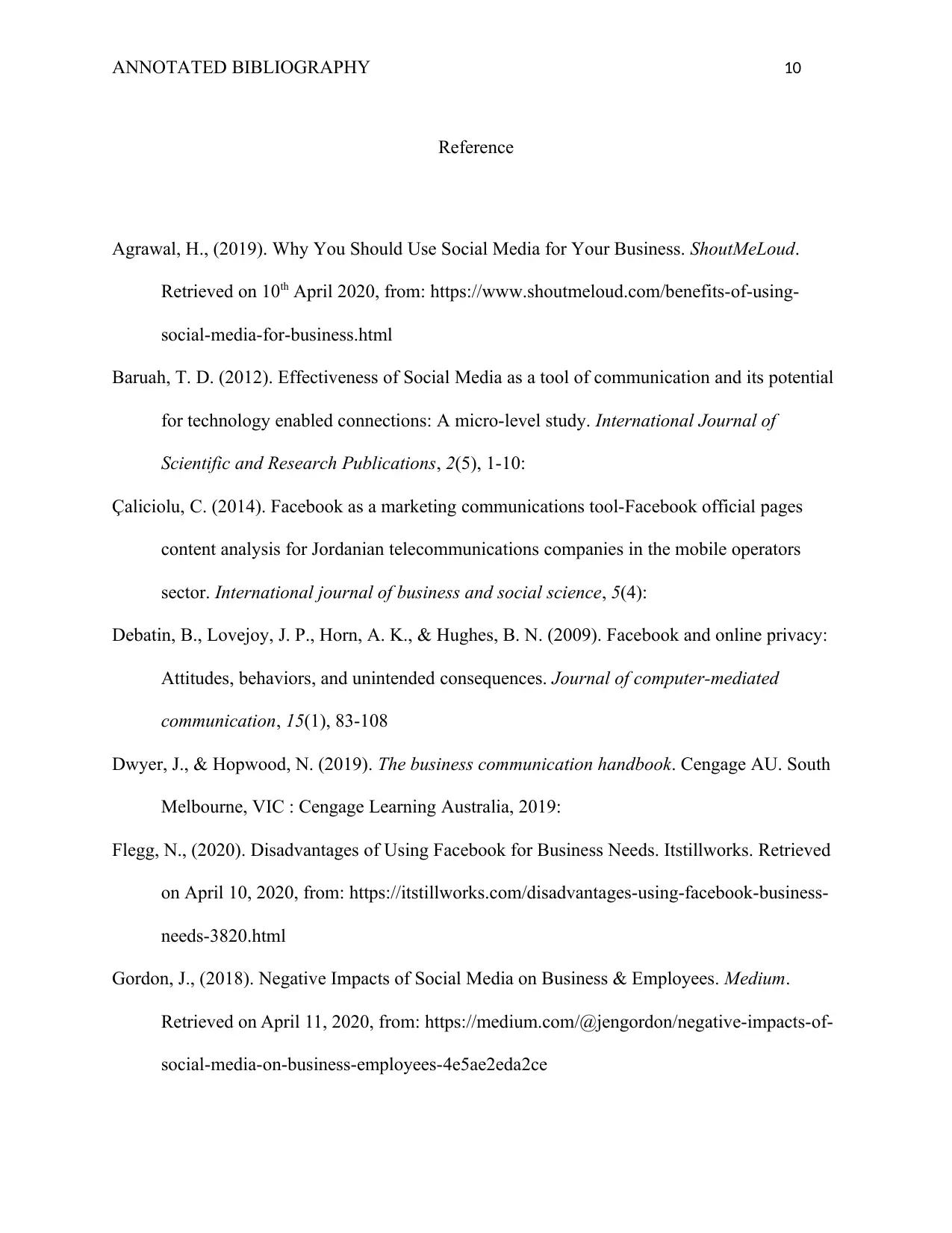
ANNOTATED BIBLIOGRAPHY 10
Reference
Agrawal, H., (2019). Why You Should Use Social Media for Your Business. ShoutMeLoud.
Retrieved on 10th April 2020, from: https://www.shoutmeloud.com/benefits-of-using-
social-media-for-business.html
Baruah, T. D. (2012). Effectiveness of Social Media as a tool of communication and its potential
for technology enabled connections: A micro-level study. International Journal of
Scientific and Research Publications, 2(5), 1-10:
Çaliciolu, C. (2014). Facebook as a marketing communications tool-Facebook official pages
content analysis for Jordanian telecommunications companies in the mobile operators
sector. International journal of business and social science, 5(4):
Debatin, B., Lovejoy, J. P., Horn, A. K., & Hughes, B. N. (2009). Facebook and online privacy:
Attitudes, behaviors, and unintended consequences. Journal of computer-mediated
communication, 15(1), 83-108
Dwyer, J., & Hopwood, N. (2019). The business communication handbook. Cengage AU. South
Melbourne, VIC : Cengage Learning Australia, 2019:
Flegg, N., (2020). Disadvantages of Using Facebook for Business Needs. Itstillworks. Retrieved
on April 10, 2020, from: https://itstillworks.com/disadvantages-using-facebook-business-
needs-3820.html
Gordon, J., (2018). Negative Impacts of Social Media on Business & Employees. Medium.
Retrieved on April 11, 2020, from: https://medium.com/@jengordon/negative-impacts-of-
social-media-on-business-employees-4e5ae2eda2ce
Reference
Agrawal, H., (2019). Why You Should Use Social Media for Your Business. ShoutMeLoud.
Retrieved on 10th April 2020, from: https://www.shoutmeloud.com/benefits-of-using-
social-media-for-business.html
Baruah, T. D. (2012). Effectiveness of Social Media as a tool of communication and its potential
for technology enabled connections: A micro-level study. International Journal of
Scientific and Research Publications, 2(5), 1-10:
Çaliciolu, C. (2014). Facebook as a marketing communications tool-Facebook official pages
content analysis for Jordanian telecommunications companies in the mobile operators
sector. International journal of business and social science, 5(4):
Debatin, B., Lovejoy, J. P., Horn, A. K., & Hughes, B. N. (2009). Facebook and online privacy:
Attitudes, behaviors, and unintended consequences. Journal of computer-mediated
communication, 15(1), 83-108
Dwyer, J., & Hopwood, N. (2019). The business communication handbook. Cengage AU. South
Melbourne, VIC : Cengage Learning Australia, 2019:
Flegg, N., (2020). Disadvantages of Using Facebook for Business Needs. Itstillworks. Retrieved
on April 10, 2020, from: https://itstillworks.com/disadvantages-using-facebook-business-
needs-3820.html
Gordon, J., (2018). Negative Impacts of Social Media on Business & Employees. Medium.
Retrieved on April 11, 2020, from: https://medium.com/@jengordon/negative-impacts-of-
social-media-on-business-employees-4e5ae2eda2ce
Paraphrase This Document
Need a fresh take? Get an instant paraphrase of this document with our AI Paraphraser
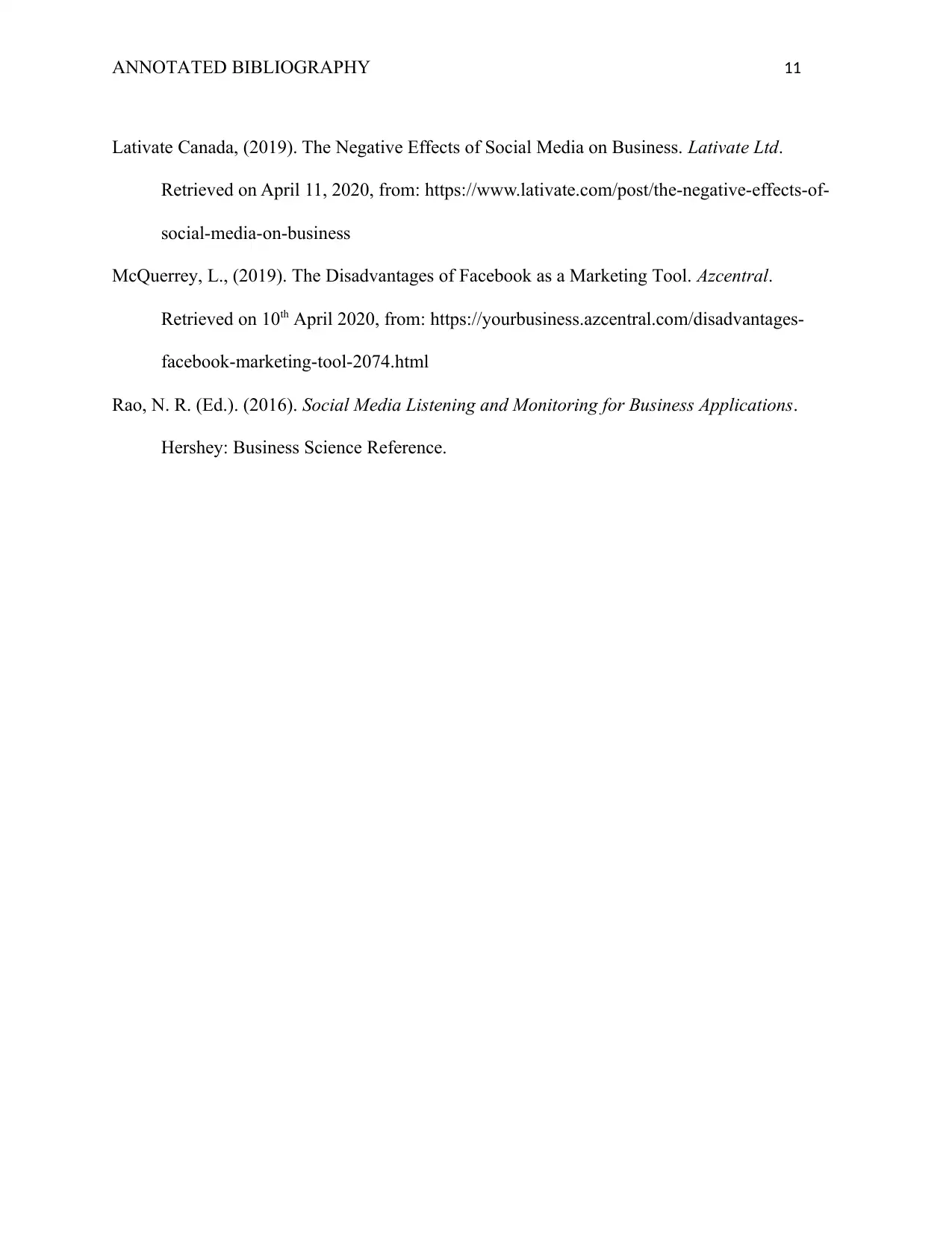
ANNOTATED BIBLIOGRAPHY 11
Lativate Canada, (2019). The Negative Effects of Social Media on Business. Lativate Ltd.
Retrieved on April 11, 2020, from: https://www.lativate.com/post/the-negative-effects-of-
social-media-on-business
McQuerrey, L., (2019). The Disadvantages of Facebook as a Marketing Tool. Azcentral.
Retrieved on 10th April 2020, from: https://yourbusiness.azcentral.com/disadvantages-
facebook-marketing-tool-2074.html
Rao, N. R. (Ed.). (2016). Social Media Listening and Monitoring for Business Applications.
Hershey: Business Science Reference.
Lativate Canada, (2019). The Negative Effects of Social Media on Business. Lativate Ltd.
Retrieved on April 11, 2020, from: https://www.lativate.com/post/the-negative-effects-of-
social-media-on-business
McQuerrey, L., (2019). The Disadvantages of Facebook as a Marketing Tool. Azcentral.
Retrieved on 10th April 2020, from: https://yourbusiness.azcentral.com/disadvantages-
facebook-marketing-tool-2074.html
Rao, N. R. (Ed.). (2016). Social Media Listening and Monitoring for Business Applications.
Hershey: Business Science Reference.
1 out of 11
Related Documents
Your All-in-One AI-Powered Toolkit for Academic Success.
+13062052269
info@desklib.com
Available 24*7 on WhatsApp / Email
![[object Object]](/_next/static/media/star-bottom.7253800d.svg)
Unlock your academic potential
Copyright © 2020–2026 A2Z Services. All Rights Reserved. Developed and managed by ZUCOL.





